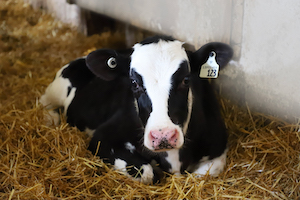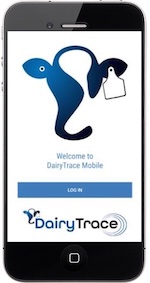How It Works
The health of our herds and the safety of the food supply are top priorities for dairy farmers, and traceability is an important part of this commitment.
Tracking Identity and Movement of Dairy Cattle
Under the traceability regulations established by the Canadian Food Inspection Agency and the requirements of proAction’s Traceability module, anyone who owns or has the possession, care or control of dairy cattle must record and report animal identity, movement, location, and custodianship information.
All dairy farms have a premises identification number. Every dairy cow in Canada has a unique identification number and is double tagged at birth. One of those tags has an RFID chip that farmers use to trace the animal’s movements from birth to the time it leaves the farm. Every time a calf is born, or a dairy cow moves from one location to another, or dies, the event is recorded and reported in a national system called DairyTrace.
Cows’ identification numbers are also used on the farm to track animal health and treatments throughout their lives. This traceability requirement is integral to the success of the Milk Quality, Food Safety, Animal Care, and Biosecurity modules of proAction.
By keeping such meticulous records and implementing comprehensive traceability practices, farmers can prepare for, manage and reduce the economic, environmental, and social impacts of potential animal health issues.
Robust traceability practices mean quicker response times to emergencies, but they also provide better data for research and an improved understanding of the movement of Canadian cattle.
Introducing DairyTrace
In October 2020, Lactanet Canada and Dairy Farmers of Canada launched DairyTrace, the national dairy cattle traceability program, providing a single, common framework for dairy farmers to track animal identity and movements. By harmonizing data under a common, national framework, DairyTrace promotes information sharing and can add value to research and genetics initiatives, all while aligning with the traceability module of proAction.
DairyTrace takes advantage of existing structures, systems and solutions within the Canadian dairy cattle sector, including partnerships with Attestra and Holstein Canada, which provides benefits in terms of efficiency, cost effectiveness and timely implementation.
Attestra has expertly led the livestock traceability program in Québec for over 18 years, under which 100% of Quebec dairy farms already have an animal movement system in place. Attestra hosts, supports, and transfers data to the DairyTrace system and continues to provide its well-established services to Quebec producers via SimpliTRACE.
Outside Quebec, dairy producers continue to purchase dairy bovine tags via the National Livestock Identification for Dairy (NLID) program, which is now dovetailed alongside DairyTrace customer services. As of September 1, 2021, all farmers outside Quebec are required to report dairy cattle movement information to DairyTrace.


